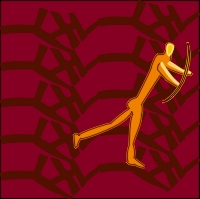
Holy Thursday 1998
Freedom to let the other be.
Readings: Is. 61.1-3a,6a, 8b-9; Rev. 1.5-8; Lk. 4.16-21.
|
Holy Thursday 1998 Freedom to let the other be. Readings: Is. 61.1-3a,6a, 8b-9; Rev. 1.5-8; Lk. 4.16-21. |
One of our big problems with the biblical accounts of the passion and death of Jesus is that they are over-laden with so much later reflection that, in a very real sense, they have unintentionally mystified the human reality. Mystified in the sense of hiding the human reality of Jesus' death. Upon which all of the theologizing was built. We have a problem, I think in trying to retrieve that human reality. So that is what I would like to suggest for tonight and the rest of Holy Week: to try to retrieve that human reality that we’re celebrating. As you probably know, this year, Passover and Easter are simultaneous, and that’s wonderful. Because basically this is our Passover, our version of the Passover. What does that mean? What were the Jews doing with Passover, with all that talk about lambs and blood? They are celebrating the fact that the God that they believed in was, above all, a God of freedom, and that is what we are celebrating. We’re celebrating freedom. We are celebrating that same God; the God of Jesus is the God of freedom. And Jesus is remarkable because he incarnated that freedom of God to an unprecedented extent. So we need to talk about what it means to be free and how is freedom expressed in what we are doing tonight. Freedom for the Jews, first of all, meant, freedom from oppression. It meant that the whole pattern of human relationships was to be altered in such a way that we would be free not to oppress each other. That is what freedom means: that I’m not driven by my compulsion to get even, or to one-up, or, more frequently, to defend and therefore to distance myself from the other. All these words express part of our repertoire of forms of oppressing each other, and allowing ourselves to be a prey to each other.
The astonishing thing about tonight is this gesture of the foot washing which is, I believe, the quintessential expression of what it is to be free. What was Jesus doing? He was making himself absolutely available to the disciples in an altogether non-intimidating fashion. What kind of freedom must a person embody to be able to operate in that fashion, with a straight face, of course? We are going to repeat Jesus' action, but we do it uneasily, and nervously. Why? Because we are not free. And the very nervousness, and awkwardness with which I and you perform the ceremony is eloquent testimony to our un-freedom.
We are called to so freely operate with each other that, as Paul will say over and over, we can put other's interests before our own. In a non-neurotic way then, to liberate them. To be able to do this is to let people be. To give people a life. To give people their own freedom. That is the only way we get freedom. Freedom is not something you confer on yourself as so much popular language has it. Buy this book so that you could learn how to free yourself. No. Freedom is always dialogical. I only become free through the other and the other become free through me and we both can carry this off, because the God who creates us is free and creates us for freedom. The highest form of freedom is Love. Love does not have to score points but again, lets the other be. Freedom underlies all of the theology of the Eucharist, of everything else, we are supposed to be talking and thinking about, and praying over tonight. That kind of liberation brought to our time and our place by what we believe is the presence of the risen Lord. And the spirit of God operating here among us now. As we will see tomorrow, freedom is fraught with danger. But tonight let us revel in that vision of freedom, for our selves and for each other.
Created: 30 Nov 1996
© Copyright: R. Trojcak, 1996, 1997, 1998, 1999, 2000, 2002
London Ontario Canada
Last Update: September 05, 2005
Comments: rtrojcak@hotmail.com